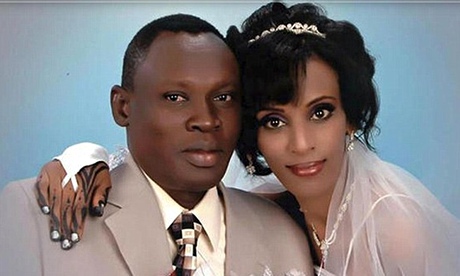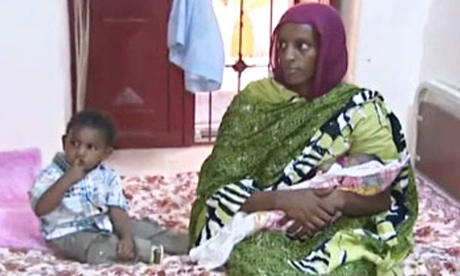Reports from Sudan claim Meriam Ibrahim 'to be freed' from death-row
Reports suggest Sudanese woman may be released within days, but her lawyers claim it's a ploy to silence outcry
Nadia Khomami-Saturday 31 May 2014
Meriam Ibrahim, the Sudanese woman sentenced to death for her Christian beliefs, will be freed in the next few days it was reported on Saturday night. The mother of two, who gave birth to a daughter on Tuesday while shackled in heavy chains, has been in jail since January.
The 27-year-old, whose young son Martin has also been forced to stay in prison with her, had been found guilty of apostasy, having married Daniel Wani, a Christian, who holds dual Sudanese-US citizenship. Her 2011 marriage was also annulled and Ibrahim was sentenced to 100 lashes for adultery.
Ibrahim told the court that she was raised a Christian after her Muslim father abandoned the family when she was a child. Her refusal to recant in the conservative Islamic country led to her death sentence by hanging, but in a dramatic turn of events Sudanese officials said her release was imminent. Abdullahi Alazreg, under-secretary at Sudan's ministry of foreign affairs, said: "The related authorities in the country are working to release Meriam through legal measures. I expect her to be released soon."
The announcement came on the back of international outrage that turned into a global campaign to save Ibrahim but her lawyers played down the announcement. "It's a statement to silence the international media," said Elshareef Ali Mohammed. "This is what the government does. We will not believe that she is being freed until she walks out of the prison."
He said he had even heard reports that the spokesman was in the UK on medical leave when he told the BBC she would soon be freed: "If they were to release her, the announcement would come from the appeal court, not from the ministry of foreign affairs. But at least it shows our campaign to free Meriam is rattling them. We must keep up the pressure."
Mark Simmonds, the Foreign Office's Africa minister, said on Saturday that Britain was "putting intense pressure on the Sudanese government" to ensure her release: "Hopefully the international outrage will push the Sudanese authorities into a situation where they feel they have to release Meriam."
 Meriam Ibrahim with her husband Daniel. Photograph: courtesy of Gabriel Wani
Meriam Ibrahim with her husband Daniel. Photograph: courtesy of Gabriel Wani
David Cameron had joined political leaders around the world in condemning the Sudanese government's actions. The prime minister said Ibrahim's treatment was "barbaric and had no place in today's world" and that the UK would "continue to press the government of Sudan to act".
He said: "Religious freedom is an absolute, fundamental human right. I urge the government of Sudan to overturn the sentence and immediately provide appropriate support and medical care for her and her children."
Nick Clegg and Ed Miliband had both said Ibrahim's case was "abhorrent", while Tony Blair described it as a "brutal and sickening distortion of faith".
An Amnesty International petition asking the Sudanese government to halt Ibrahim's execution attracted more than 200,000 signatures, and more than 600,000 people added their name to a separate petition on change.org.
Since her arrest, Ibrahim, a graduate of Sudan University's school of medicine, has been held on death row with her son and since last week her newborn daughter Maya. She was pregnant at the time of her sentencing and was told that her death sentence would be deferred for two years to allow her to nurse her baby.
The case has led to debates over whether the government should continue giving foreign aid to Sudan. Former defence secretary Liam Fox said the UK should reconsider whether it was "acceptable" to give aid money to "states which allow treatment such as that handed out to Meriam Ibrahim", but international development secretary Justine Greening said it was "totally perverse" to take away UK-funded food, water and other vital supplies to those worst affected.
"British aid to Sudan only goes on helping the very poorest Sudanese people via the UN and NGOs, and not a penny is given to the Sudanese government," she said.
Sudan has a majority Muslim population and its legal system has been based on Islamic law since the 1980s.
A Foreign Office spokeswoman said: "We are urgently seeking clarification from the Sudanese authorities of reports that Meriam Ibrahim …is to be freed. We have been strongly urging the government of the Republic of Sudan to do all it can to overturn its decision to sentence her to death."

